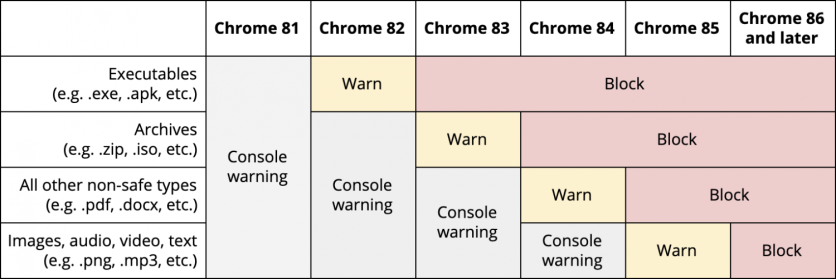
Google eyes informing web users on "insecure" downloads and sooner or later block them outright on the next Google Chrome update. Chrome's new feature is part of Google's plan to secure the web with HTTPS.
Insecure files can't sit with your safe files, seriously.
In a blog post, Joe DeBlasio of the Chrome safety team said the company would make sure that secure pages (or those starting with HTTPS sites) could only allow you to download safe files. Insecurely-downloaded documents, according to DeBlasio, are a "risk" to users' safety and privacy.
"Insecurely-downloaded programs, for instance, could be swapped out for malware by attackers. Eavesdroppers [could also] examine users' insecurely-downloaded financial institution accounts," DeBlasio stated.
Google says addressing these risks is crucial since Chrome's current version doesn't indicate users that their privacy and security are at risk while they're downloading content on secure pages.

Beginning with Chrome 82, due for release in April, Chrome will warn users if they're about to download mixed content executables from a stable website.
Then, when version 83 is released, the ones executable downloads could be blocked, and the caution can be implemented to archive files. PDFs and .Doc files will get the warning in Chrome 84, with audio, images, text, and video files showing it with the aid of the 85th version. Finally, all mixed content downloads - a non-stable file coming from a stable site - may be blocked as of the discharge of Chrome 86.
"In the future, we count on to similarly restrict insecure downloads in Chrome," DeBlasio wrote. This is all part of Google's attempt to fully migrate builders over to HTTPS. Last year, Google started blocking off HTTPS web sites from flattening insecure web page resources.
Chrome's gradual update to inform developers on their sites before affecting clients
Google claims that since cellular structures have better native safety towards malicious files, the put off will give developers a head-start toward updating their web sites before customers are impacted. Developers can make sure that downloads simplest use HTTPS in case they don't need customers ever to see a download warning.
Additionally, in the present-day model of Chrome Canary, or in Chrome 81 as soon as its released, developers also can prompt a caution on all mixed content material downloads for testing with the aid of allowing to "treat unstable downloads over insecure connections as lively mixed content" flag.
Google also plans to restrict insecure downloads in Google Chrome within the future, and to this effect, the organization has urged builders to absolutely migrate to HTTPS so as to keep away from restrictions.
These warnings also are coming to the Android and iOS variations of Chrome, but the above schedule could be delayed through launch for the cellular platforms.
![Apple Watch Series 10 [GPS 42mm]](https://d.techtimes.com/en/full/453899/apple-watch-series-10-gps-42mm.jpg?w=184&h=103&f=9fb3c2ea2db928c663d1d2eadbcb3e52)



